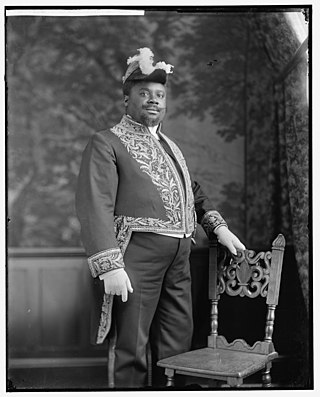
Juan Manuel José Domingo Ortiz de Rosas, nicknamed "Restorer of the Laws", was an Argentine politician and army officer who ruled Buenos Aires Province and briefly the Argentine Confederation. Although born into a wealthy family, Rosas independently amassed a personal fortune, acquiring large tracts of land in the process. Rosas enlisted his workers in a private militia, as was common for rural proprietors, and took part in the disputes that led to numerous civil wars in his country. Victorious in warfare, personally influential, and with vast landholdings and a loyal private army, Rosas became a caudillo, as provincial warlords in the region were known. He eventually reached the rank of brigadier general, the highest in the Argentine Army, and became the undisputed leader of the Federalist Party.

Lieutenant General José Félix Benito Uriburu y Uriburu was the President of the Provisional Government of Argentina, ousting the successor to President Hipólito Yrigoyen by means of a military coup and declaring himself president. From 6 September 1930 to 20 February 1932, he controlled both the Executive and Legislative branches of government. As "President of the Provisional Government," he acted as the de facto Head of state of Argentina. His was the first of a series of successful coups d'état and unconstitutional governments that came to power in 1943, 1955, 1962, 1966, and 1976.

Horace Pauleus Sannon was a Haitian historian, politician and diplomat.

The Revolutionary Febrerista Party is a democratic socialist party of Paraguay. It was established in 1951 by Rafael Franco, President of Paraguay from the February Revolution of 1936 until his overthrow in August 1937.
The Instituto Lingüístico de Verano A.C. is a non-profit organization incorporated in Mexico with the legal status of a civil association. It is the affiliate body in Mexico to the overarching parent organization SIL International, a worldwide U.S.-based evangelical Protestant organization that sponsors the study, documentation and development of indigenous and minority languages across the world. ILV in Mexico was formally established in 1948, with a stated focus on the study and documentation of the indigenous languages of Mexico and involvement with Mexico's indigenous peoples' affairs generally. The Institute publishes dictionaries, grammars and other literacy and education materials in many of the indigenous languages, and it is also a sponsor of language workshops, presentations and conferences. As a body with ongoing degrees of association and sponsorship of Christian missionary activities and goals, ILV also works to produce translations of Biblical texts in local languages.
Claudio Véliz is an economic historian, sociologist and author from Chile, who has held numerous academic posts in various institutions of higher learning including La Trobe University (Australia), Harvard and Boston University.
David Peter Rock is a Latin Americanist historian, who specializes in the history of Argentina. He is a retired professor at the Department of History at the University of California, Santa Barbara, who now lives in England.

General elections were held in Nicaragua on 3 February 1957 to elect a president and National Congress.
Luis Somoza Debayle formalized his grip on the presidency through fraudulent elections in February 1957 which were boycotted by all the opposition except the puppet Conservative Nationalist Party (PNC). The Popular Social Christian Party (PPSC) was created in reaction to these elections and received support from younger Conservatives dissatisfied with their party’s inability to make any political impact on the dictatorship.

The Labour Party is a populist political party in Argentina.

The Cambridge Modern History is a comprehensive modern history of the world, beginning with the 15th century Age of Discovery, published by the Cambridge University Press in England and also in the United States.
The New Cambridge Modern History replaced the original Cambridge Modern History in an entirely new project with all new editors and contributors. It was published by Cambridge University Press in fourteen volumes between the 1950s and the 1970s. It included a wide range of new scholarship on traditional themes as well as more coverage of science, technology, political ideas, the arts, intellectual history, and the art of warfare. The Shifting Balance of World Forces 1898–1945 brought the chronology down to 1945. The chair of the editorial board was Sir George Norman Clark. The New Cambridge Modern History has been described as "a comprehensive examination of the political, economic, social, and cultural development of the world from 1493 to 1945".

Italian nationalism is a movement which believes that the Italians are a nation with a single homogeneous identity, and therefrom seeks to promote the cultural unity of Italy as a country. From an Italian nationalist perspective, Italianness is defined as claiming cultural and ethnic descent from the Latins, an Italic tribe which originally dwelt in Latium and came to dominate the Italian peninsula and much of Europe. Because of that, Italian nationalism has also historically adhered to imperialist theories. The romantic version of such views is known as Italian patriotism, while their integral version is known as Italian fascism.
Leslie Michael Bethell is an English historian and university professor, who specialises in the study of 19th- and 20th-century Latin America, focusing on Brazil in particular. He received both his Bachelor of Arts and doctorate in history at the University of London. He is emeritus professor of Latin American history, University of London, and emeritus fellow of St Antony's College, University of Oxford. Bethell has served as visiting professor at the University Research Institute of Rio de Janeiro, the University of California, San Diego, the University of Chicago, the Fundação Getulio Vargas in Rio de Janeiro, the University of São Paulo and most recently the Brazil Institute, King's College London from 2011 to 2017. He has been associated with the Woodrow Wilson International Center for Scholars for many years, most recently as senior scholar of the Brazil Institute from 2010 to 2015. He was a fellow of St Antony's College and founding director of the Centre for Brazilian Studies at the University of Oxford from 1997 to 2007. He was lecturer, reader and professor of Latin American history in the University of London from 1966 to 1992 and director of the University of London Institute of Latin American Studies from 1987 to 1992.

The 1930 coup d'état, also known as the September Revolution by its supporters, involved the overthrow of the Argentine government of Hipólito Yrigoyen by forces loyal to General José Félix Uriburu. The coup took place on 6 September 1930 when Uriburu led a small detachment of troops into the capital, experiencing no substantial opposition and taking control of the Casa Rosada. Large crowds formed in Buenos Aires in support of the coup. Uriburu's forces took control of the capital and arrested Radical Civic Union supporters. There were no casualties in the coup.
Roberto de Laferrère was an Argentinean writer and political activist. He was one of the leading figures in the nationalist movement active amongst a group of leading intellectuals in the 1930s.

The Nationalist Liberation Alliance, originally known as the Argentine Civic Legion from 1931 to 1937, the Alliance of Nationalist Youth from 1937 to 1943, and then using its final name from 1943 to 1955, was a Nacionalista and fascist movement.

Hyperinflation in Brazil occurred between the first three months of 1990. The monthly inflation rates between January and March 1990 were 71.9%, 71.7% and 81.3% respectively. As accepted by the International Monetary Fund (IMF), hyperinflation is defined as a period of time in which the average price level of goods and services rise by more than 50% a month.
Murdo J. MacLeod is a Scottish historian of Latin America, publishing extensively on the history of colonial-era Central America, the Caribbean, and the Atlantic world. His monograph Spanish Central America: A Socioeconomic History is a major contribution to the field.
The Cambridge History of Latin America is a history of Latin America, edited by Leslie Bethell and published in 12 volumes between 1985–2008.
The Republic of Peru became a member of the United Nations (UN) on October 31, 1945, being a founding member of the organisation. The 5th Secretary-General of the United Nations was Javier Pérez de Cuéllar, a Peruvian diplomat. He held the position from 1982 to 1991.











